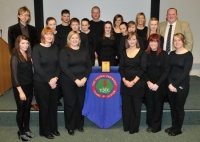History
William Rankin, BAgr, put it accurately in a series of articles he contributed to The Ulster Young Farmer about the early days of the movement when he wrote:
- "It required courage, vision, inspiration and absolute belief in one's own convictions to attempt anything like creating an organisation for young farmers in those days, and Northern Ireland was fortunate that such a man was found in the person of W.S. Armour." [3]
W.S. Armour

William Staveley Armour was a North Antrim man, born in the town of Ballymoney in 1883, the eldest son of the illustrious Rev. J.B. Armour, a man known throughout Ulster for his leadership of the local farmers in the Tenant Right Campaign of the 1870s. Through the contacts which his father had with the farming world, he came to appreciate and understand farmers' difficulties, and he had also first hand experience of a farm, for as a boy he spent much of his free time on his grandfather's farm at Lisboy, Kilraughts.
In 1903 he went up to Oxford on a scholarship to Jesus College. There he had a distinguished academic career and gained renown as a debater, being elected President of the Union in 1907, a much coveted position which is supposed to open the way to a Westminster seat and early elevation to cabinet rank. That was not to be W.S. Armour's path. He gained his law degree, went on to be a member of the Inner Temple and became a Barrister-at-law, but, while still pursuing his law studies, he chose for the moment to enter the sphere of education and sailed for India in 1910.
At first he was a headmaster and later an inspector of schools, but when the First World War began in 1914 he was given special responsibility for war publicity at Allahabad, eventually becoming editor of the United Provinces War Journal . He also published a short account of the war, which sold half a million copies in India, and wrote a number of school textbooks. For his services he was honoured by H.M. King George V with the MBE.
After his return to London in 1922, Armour received word that his father was very ill. What happened next he recorded in his book, Facing The Irish Question:
- "I went home for six weeks, and on the way to London via Belfast the idea came to me that in the circumstances I should stay there. Without any premeditation, I went straight to the proprietor of The Northern Whig and asked whether there was any position on his paper." [4]
He obtained the position of reporter, but after six weeks was elevated to become 'Writer of Special Articles' and in 1928 took over the editorship. The Northern Whig was then one of the three big daily newspapers published in Belfast and Armour brought to it his many talents and rich experience. Even as editor, special articles remained his penchant and under the initials 'WA' he wrote on subjects ranging from political controversy, to all sorts of educational matters and accounts of people and places from his world travels, to investigation of social problems in Northern Ireland and suggestions for their improvement.
It was while pursuing this latter theme that he wrote the article which began the Young Farmers' Movement in Ulster.
Two things must strike everyone who moves about rural Ulster. The first is the steady drain of youth from the countryside to the cities and abroad. One reason is that they have very few interests and are frankly bored with life. The second picture is of young people night after night loafing round corners, winter and summer, with nothing whatsoever to do. They are like the people "standing idle in the market place ... because no man hath hired us". In this paper there have been constant references to the happier state a century ago; ... also from time to time there have been accounts of young farmers' clubs and similar movements, but nothing has happened and things remain just as before. We must try again and see whether something cannot be done this time'.
As usual he had researched his article thoroughly and had been in contact with the YFC Movement in England. It had already attracted membership of over two thousand, with ninety-four clubs in existence in various parts of the country.
Structuring Young Farmers' Clubs

W.S. Armour said it was essential to hold a public meeting to test local opinion and especially to invite parents and teachers to attend. If opinion was favourable then the choice of an enthusiastic and responsible person to act as Club Leader was vital. He felt clubs should be open to all young people under the age of twenty and he favoured the idea, used in England, that each member should be encouraged to either own livestock or to interest him or herself in a garden or allotment. Members should meet regularly to compare notes, discuss costs and hear talks from experts. He noted that in England these meetings had gradually developed into a social centre for the young people of the village and hoped the same would be true of Ulster. He said one of the most promising features of the YFC movement was that it provided a practical and popular starting point from which other activities for the benefit of the young people could be developed.
